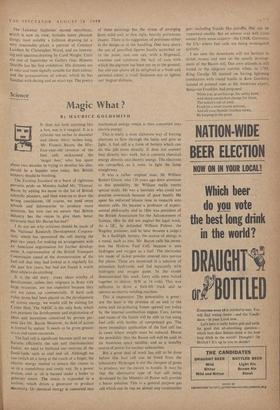Science
Magic What ?
By MAURICE GOLDSMITH
The Evening Standard in a burst of righteous patriotic pride on Monday hailed Mr. 'Thomas' Bacon by adding his name to the list of British scientific pioneers, and then went on to draw the Wrong conclusions. Of course, we need more schools and laboratories to produce more scientists, but how can we ensure that British industry has the vision to give them better treatment than Mr. Bacon has had?
I do not see why criticism should be made of the National Research Development Corpora- tion. which has sponsored the cell during the past two years. for making an arrangement with an American organisation for further develop- ment. A representative of the British Transport Commission stated at the demonstration of the fuel cell that they had looked at it regularly for the past few years, but had not found it worth their while to do anything.
It is the old story: many ideas worthy of development, unless they originate in firms with large resources, are not exploited because they are not taken up commercially. If hard cash value terms had been placed on the development of atomic energy, we would still be waiting for Calder Hall. The NRDC is the only body which can promote the development and exploitation of ideas and inventions conceived by private per- sons like Mr. Bacon However, its field of action is limited by statute It needs to be given greater scope and vaster resources.
The fuel cell is significant because until we can harness efficiently the sun and thermonuclear fusion, we need to husband our reserves of the fossil-fuels, such as coal and oil. Although we can switch on a lamp at the touch of a finger, the electric energy needed to ensure this comes to us in a roundabout and costly way. In a power station, coal or oil is burned under a boiler to generate steam. The steam is expanded in a turbine, which drives a generator to produce electricity. Or chemical energy is converted into mechanical energy which is then converted into electric energy.
This is really a most elaborate way of forcing electrons to flow through the lamp and give us light. A fuel cell is a form of battery which can do this job more directly. It does not convert heat directly into work, but it converts chemical energy directly into electric energy. The electrons are compelled, as it were, to light the lamp straightwa y.
It was a rather original man, Sir William Robert Grove, who 120 years ago drew attention to this possibility. Sir William really merits special study. He was a barrister who could not practise overmuch because of poor health. He spent his enforced leisure time in research into electric cells. He became a professor of experi- mental philosophy and in 1866 was president of the British Association for the Advancement of Science. (But he did not neglect his legal work. As a QC, he defended William Palmer, the Rugeley poisoner, and he later became a judge.)
In a flashlight battery, the source of energy is a metal, such as zinc. Mr. Bacon calls his inven- tion the Hydrox Fuel Cell, because it uses hydrogen and oxygen as a fuel. The electrodes are made of nickel powder centred into porous flat plates. These are immersed in a solution of potassium hydroxide and fed separately with hydrogen and oxygen gases. In the model demonstrated this week, forty cells were bolted together to deliver 5kW at 24 volts. This was sufficient to drive a fork-lift truck and to operate an electric welding machine.
This is impressive. The potentiality is great : not the least is the promise of an end to the noise .and air-polluting fumes spewed out today by the internal combustion engine. Cars, lorries and trains of the future will be able to run using fuel cells with bottles of compressed gas. The more immediate application of the fuel cell lies in cases where weight must be reduced. Hence the possibility that the Bacon cell will be used in an American space satellite, and as a standby source of power for nuclear submarines.
But a great deal of work has still to be done before this fuel cell can be freed from the laboratory. Hydrogen is not the cheapest of gases to produce. nor the easiest to handle. It may be that the alternative type of fuel cell being developed by the Ministry of Power will provide a better solution. This is a general purpose gas cell which can be run on almost any combustible
gas—including liquids like paraffin that can he vaporised readily. But an answer may well come sooner from some country—the USSR, Germany, the US—where fuel cells are being investigated
actively.
I am sure the Americans will not hesitate to lavish money and men on the speedy develop- ment of the Bacon cell. Our own attitude is still stated in the epigram current when, in 1780, King George III insisted on having lightning conductors with round knobs at Kew Gardens, instead of pointed ones as the American expert, Benjamin Franklin, had proposed : While you. great George, for safety hunt, And sharp conductors change for blunt, The nation's out of joint.
Franklin a wiser course pursues, And all your thunder fearless views, By keeping to the point.














































 Previous page
Previous page